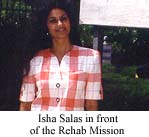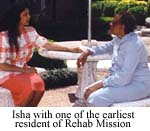Houston businesswoman finds her
calling among the homeless

Radhika R Shankar in Houston
 With her exotic model-like looks, vibrant personality, and love to be around people, Isha Salas could have been successful in a number of fields, but her choice was to help senior citizens who have ended up on the streets.
With her exotic model-like looks, vibrant personality, and love to be around people, Isha Salas could have been successful in a number of fields, but her choice was to help senior citizens who have ended up on the streets.
Known to many as the Mother Teresa of Houston, Salas has received commendation for her work from President Bill Clinton and former president George Bush. She received the 1996 John C Sealy Memorial Award for her outstanding accomplishment in the Houston community. And recently she received kudos from the National Immigration Forum for her service to the community.
While she was growing up in Trinidad, Salas's parents taught her to help the underprivileged without expecting anything in return. "During the festival seasons my parents took us to distribute food and clothes to the needy and taught us the pleasure in sharing," she said.
Migrating to Syracuse, New York, at age 13 to live with her older sister, Salas developed a drive to achieve her dream of being a business owner. By age 27, she was called to California to help her sister who was moving to Texas.
What was meant to be a stopover in San Antonio turned into relocation when Salas fell in love with the historic Texan city. About the time, Salas began her master's degree in occupational therapy at Texas Women's University. She also began noticing the neglected condition of many senior citizens in the city, and realised that the older-generation Americans lacked the family support that Indian families provided for their senior citizens, which led many to a state of loneliness and poverty.
 "My parents taught me that every problem has a solution and we were taught to cherish and respect older people unlike the Western tradition," she said.
"My parents taught me that every problem has a solution and we were taught to cherish and respect older people unlike the Western tradition," she said.
Knowing that she needed to support herself before she could help anyone, Salas moved to Houston within a year and started a communication company. As soon as business picked up, she began helping homeless seniors in Houston in ways she could afford. "At first I left lunch packs at the kerb sides where the homeless citizens camped," she explained.
But Salas wanted to do much more for the weak and broken people who lived in cardboard boxes under the freeway and was looking for ways that she could help rehabilitate them.
Coming across the book, If You Had Six Months to Live, What Would You Do? in 1988 had Salas re-evaluate her mission in life. Meanwhile her business kept her busy and she had shelved her intent of looking for ways to help the seniors.
Later that year, while on a business trip to India, she found the solution. She came across a beggar who reminded her of her mother and all she could think of was the poor woman on the streets. Salas knew what she had to do and as soon as she returned to Houston, she sold her home and her business, and used all her savings to buy a condemned apartment complex.
Working round the clock almost single-handedly, Salas turned the run-down place, which used to be a shelter for drug addicts, into the Rehab Mission to rehabilitate homeless senior citizens. Though her parents and sisters supported her idea, most people thought she'd never be able to make the place habitable since she could not afford furniture, food, and utilities needed to run the shelter.
But Salas, driven by a greater need, raised chickens in the parking lot, climbed the two-storey building's roof to sweep out the rain water, scourged rejects at wholesale vegetable vendors, and begged butchers for bones and scraps for soup.
Soon word got around about Salas's determined efforts and people started donating material and volunteers offered to help paint the building and cook the meals. Local organisations and individuals began helping with donations to take care of monthly operating expenses, which add up to about $ 3,000.
The Rehab Mission shelters about 70 residents, all 50 years or older, for a maximum of two years. Salas's intent is to help her residents get back on their feet and lead independent lives within the period.
"Many who come in are bitter at the loss of their loved ones, their job or health and when they arrive their primary need is to find a will to live," said Salas. There have been occasions when terminally ill residents find the Rehab Mission a haven until their end. "I believe that what most senior citizens need is not a hand-out but support and encouragement in people skills, job search skills and ways to become independent." And the Rehab Mission provides all this as well as helps co-ordinate with health agencies so that the residents' primary concerns are met before they are ready to enter society again.
Salas lives and eats at the Mission and spends her free time getting to know her residents so that she can understand their concerns and be close to them. "For the past 10 years the Rehab Mission has been my life," she said.
 Each year, Salas's 70-plus-year-old parents visit the Mission to plant a kitchen garden that provides vegetables for the residents for the whole year.
Each year, Salas's 70-plus-year-old parents visit the Mission to plant a kitchen garden that provides vegetables for the residents for the whole year.
Looking back at the budding difficulties, Salas says, "I have never had any regrets. I have learned patience, and that when you give expecting nothing in return you get the greatest pleasure."
But Salas believes her mission has just begun and she has miles to go before she sleeps.
She has now started a shelter for homeless and battered children across the street from the seniors' facility so that the young and the old can interact. "We have 10 children and a grandmother at the shelter. Many girls get pregnant by the age of 13 and have no one to take care of them. We now have a house, emergency care and counselling to get into holistic healing," she said.
While grants have started coming in and the revenue from a thrift store run by the Mission helps with day-to-day expenses, Salas's concern is now focused on establishing a foundation that will support the shelters after her time.
For more information or to contribute to the Rehab Mission, contact (713) 957-0099.
Radhika Shankar is a stringer for The New York Times and USA Today. She has been published in The Far Eastern Economic Review and Houston Chronicle.)
Tell us what you think of this feature.
|



